The Economics and Statistics Division maintains archives of previous publications for accountability purposes, but makes no updates to keep these documents current with the latest data revisions from Statistics Canada. As a result, information in older documents may not be accurate. Please exercise caution when referring to older documents. For the latest information and historical data, please contact the individual listed to the right.
<--- Return to Archive
For additional information relating to this article, please contact:
March 17, 2021PRINCE EDWARD ISLAND BUDGET 2021-22 The government of Prince Edward Island has tabled its 2021-22 Operating Budget and supporting documents. Prince Edward Island anticipates a deficit of $120.0 million for 2020-21, followed by deficits of $112.1 million in 2021-22, $45.7 million in 2022-23 and $27.9 milion for 2023-24. Revenues are projected to grow by 5.0% in 2021-22 and by an average of 4.0% over the next two fiscal years. Expenditures are projected to grow by 4.4% in 2021-22, followed by average growth of 2.2% in each of the next two fiscal years.
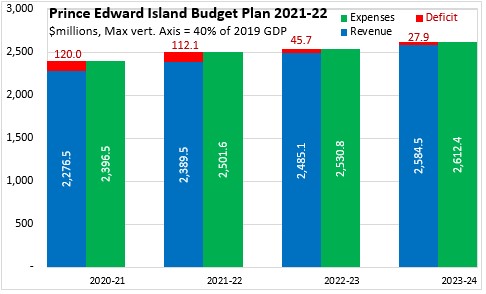
Prince Edward Island's 2020-21 Budget was released in June 2020, after the impacts of restrictions to contain the COVID-19 pandemic became clearer. At the time, the Prince Edward Island Budget anticipated a sharp rise in expenditures along with modest revenue growth. This was to be followed by a decline in both revenues and expenditures.
In the latest revisions to the fiscal plan, expenditure growth is now projected to be more moderate for 2020-21, but expenditures are also projected to remain elevated in the next two fiscal years. Instead of declining, revenue growth is projected to follow its previous trend growth rate.
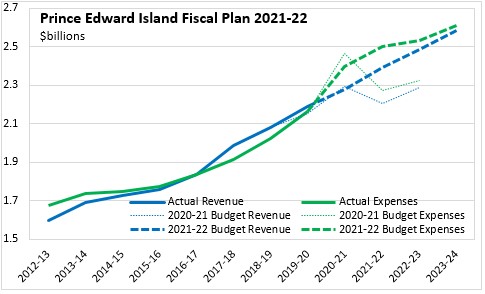
Prince Edward Island's deficit is projected to be smaller for 2020-21 than estimated in the Budget. However, the deficit is projected to be larger for 2021-22 than in the previous fiscal plan.
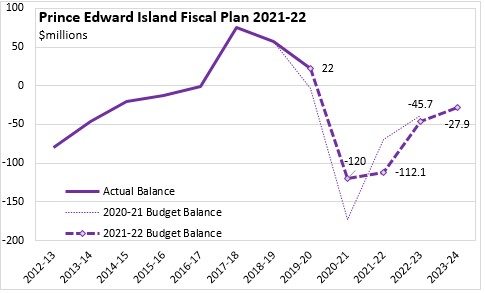
Prince Edward Island's deficit amounts to about 1.6% of GDP in 2020-21 and 1.4% of GDP in 2021-22. With the economy projected to contract in 2020, the provincial government's footprint in the economy has risen to over 32% of GDP. By 2023-24, the footprint of government in the Prince Edward Island economy is projected to shrink to 31.6% of GDP.
Prince Edward Island's net debt to GDP ratio is estimated to peak at 35.4% of GDP in 2021-22, followed by a decline in each of the next two years. Prince Edward Island's net debt to GDP ratio is projected to fall to 33.8% by 2023-24.
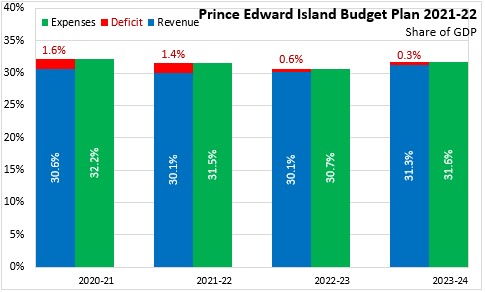
Prior to the pandemic, the Prince Edward Island economy enjoyed some of the strongest growth among Canadian provinces in recent years, rising along with improved demographics. The consensus estimate for Prince Edward Island's real GDP in 2020 was a decline of 3.5%. The consensus outlook projects a rebound of 4.0% in 2021. As the pandemic's restrictions continue to be eased with rollout of vaccines, domestic spending and construction are expected to contribute to Prince Edward Island's economic rebound. However, until the pandemic is fully under control, Prince Edward Island's manufacturing, exports and tourism face slower recovery.
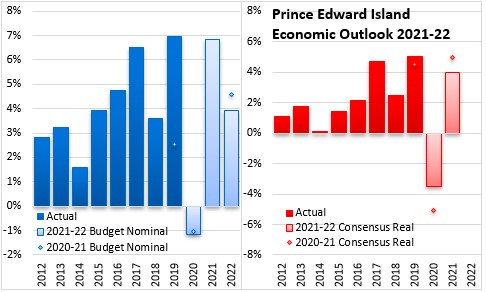
Key Measures and Initiatives
The government of Prince Edward Island announced several initiatives under the theme of recovery in its 2021-22 Budget:
- Increasing the Basic Personal Exemption under personal income tax by $750, raising the low-income tax threshold by $1,000 and reducing the small business tax rate to 1%
- Innovation, Strategic Improvement and Small Business funding to support business recovery
- $50 million in lending to support adoption of clean technologies
- Expanding virtual health care, rural health, mental health, nursing recruitment and measures to keep seniors in their homes
- Supporting labour market attachment for assistance recipients along with increased shelter and food allowances
- Enhancing funds to transition residential energy to cleaner sources
- Simplifying access to government services
- Increasing departmental capacity to examine gender equity and diversity in government programs and policies
- Affordable housing initiatives: rent supplements, vouchers as well as supports for shelters
- Funding for land protection
- Community development through support for the Black Cultural Society, L'nuey work on treaty education and non-profit societies
- Launching a half-day universal pre-Kindergarten program and expanding child care spaces
- Extending student debt deferrals until September 2021
Prince Edward Island Budget 2021-22
<--- Return to Archive